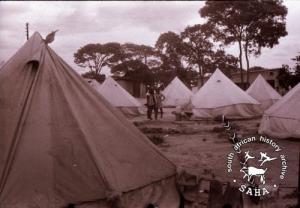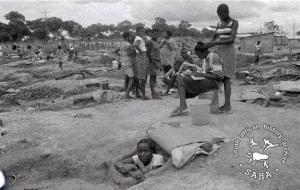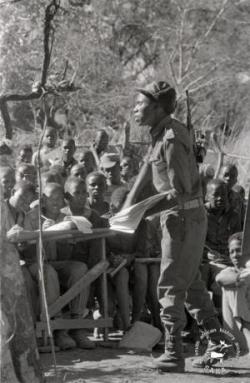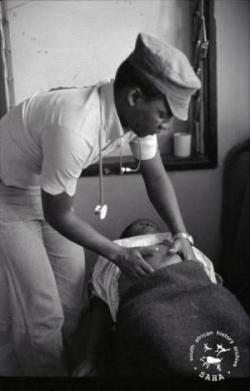 Refugee camps were certainly not part of ZAPU's plan or design. They were rather one inevitable outcome of the developing war situation within the country. As the guerrillas established themselves and pushed into more areas, the Rhodesian regime retaliated ever more viciously and the civilians became the victims. The majority supported the guerrillas and when daily life became intolerable, they fled across the borders to seek refuge. Some remained in Botswana, particularly in the refugee camp known as Dukwe, but thousands were transported by air to Zambia. At first there was no particular programme or plan as to what to do with them, how to occupy them. However, as more and more arrived, it was necessary to develop a strategy. The party was assisted when MPLA, returning their personnel home after the end of their war of liberation, in 1976 offered ZAPU the use of a farm outside Lusaka. This became known as Victory Camp, and was immediately put to use to accommodate refugees. Another location was also obtained in the same area, and was named JZ Moyo Camp - after Jason Ziyaphapha Moyo who was assassinated in January 1977.
Refugee camps were certainly not part of ZAPU's plan or design. They were rather one inevitable outcome of the developing war situation within the country. As the guerrillas established themselves and pushed into more areas, the Rhodesian regime retaliated ever more viciously and the civilians became the victims. The majority supported the guerrillas and when daily life became intolerable, they fled across the borders to seek refuge. Some remained in Botswana, particularly in the refugee camp known as Dukwe, but thousands were transported by air to Zambia. At first there was no particular programme or plan as to what to do with them, how to occupy them. However, as more and more arrived, it was necessary to develop a strategy. The party was assisted when MPLA, returning their personnel home after the end of their war of liberation, in 1976 offered ZAPU the use of a farm outside Lusaka. This became known as Victory Camp, and was immediately put to use to accommodate refugees. Another location was also obtained in the same area, and was named JZ Moyo Camp - after Jason Ziyaphapha Moyo who was assassinated in January 1977.
For just the next three years these camps became the centre of many activities for ZAPU refugees. At first Victory Camp was the main holding area for the women and girls and all the younger children. Although there were some buildings left behind by the Angolans, most of the refugees were accommodated in tents and carried water from bowsers in buckets. Bathing was in a near-by stream at the beginning. Regina Ndlovu arrived at Victory Camp in early 1977 and she explains in her interview how things changed as the camp developed and the party's plans took shape.
When she arrived the camp still had a military atmosphere, which was evidently quite intimidating for the girls, as she described her memory of her arrival:
... the security officers who were manning the camp were ladies in their uniforms and with guns. ... it was quiet to all of us in the car. And the driver had to report in a language that we were not used to, it was a military language. And he was shown where to drop us. We were made to queue in a military way and we were immediately addressed, "Welcome, this is Victory Camp. We are, we are not trusting you. Some of you might be Selous Scouts. We will be conducting personal interviews and from now on, forget your name. We are going to give you another one. And get used to it. Remove your shoes. The ladies will be searched by other ladies and the males by other males..."
This was at a time when the Women's Brigade was still housed at VC and before the school was formally established. According to Ndlovu:
Before it was a refugee camp, we would rotate, according to companies. We called ourselves companies - Company A, Company B, platoon so and so is taking care of the catering.
Within each unit individuals would be given duties, and she describes her role as a medic which was:
... to make sure anyone who is not feeling well, I report to the relevant authority, get medication or if there is need for anyone to be taken to hospital, I would accompany the person to the hospital. When they come back, if they are not well, I monitor whether they are getting their medication, etc...
The harshness of the military life could be felt more by the young girls - as she relates:
I remember when I was menstruating; I did not have enough cotton wool. And we were supposed to wake up at around 4 o'clock for military exercises we called toyi-toyi. And I was wondering what would happen when I am toyi-toying.... I then said to myself, what do I do? Should I go and wake up the medic [she did not remain the medic throughout] and tell her that today I would not be able to go for toyi-toyi? But that was not supposed to be an excuse because they would tell you, this is a lifetime process. What would you do if you were in the bush and the enemy was following you behind? Would you say, today I am menstruating, I will not shoot?
 It could not have been easy to keep such large numbers controlled and occupied, and yet discipline was necessary in such an insecure environment. The girls dug pits for defence, with each one having their individual hole. They knew that they were really more camouflage than effective defence from aerial attack, except they would protect anyone who took refuge in them from flying shrapnel or from napalm. Elingworth Poli explained:
It could not have been easy to keep such large numbers controlled and occupied, and yet discipline was necessary in such an insecure environment. The girls dug pits for defence, with each one having their individual hole. They knew that they were really more camouflage than effective defence from aerial attack, except they would protect anyone who took refuge in them from flying shrapnel or from napalm. Elingworth Poli explained:
... you know when they throw the napalm on us, we could be safe, because the pit was such that you dig downwards and then to sideways, such that this one is just an entrance, we would be behind there.
A system of whistle warnings was instituted to warn of a threatened attack. No direct attack on Victory Camp ever took place, but the sight of war planes overhead was enough to cause panic, especially when it was known that other camps nearby had been a ttacked. Later the defence pits were abandoned and a proper anti-aircraft defence was organised.
The camp command was at pains to create a united group of Zimbabweans, and had strict rules about tribalism. On arrival they were told:
No tribalism. You don't come from Gwanda, you come from this camp. You don't have a language of your own. Any language which is spoken here is your language. We don't want to hear anyone calling someone Shona, Ndebele, a Venda, Kalanga. You are one. From today onwards.
She learned that punishment could be harsh when she let slip a tribal comment one day and was forced to spend the rest of the day carrying a heavy back pack. Others were punished for sometimes sneaking out of the camp - not normally to run away , but just to try to reach Lusaka and spend a day in town or looking for relatives. Many of the girls did have relatives living in or around Lusaka and it was possible to get permission to spend a weekend with them if they were known to the party, but sneaking out without permission was absolutely forbidden.
Boredom must have been a constant companion in those early days before the school was organised. But gradually things were put in place for a formal school to be established, entertainments, choirs, sports competitions were arranged, and some semblance of the elements of normal life was created. A school was established and those members from amongst the refugees and recruits who were trained teachers were drafted in to teach. Meeting Nkala relates how he had been assigned to the boys as a teacher, but was then sent to VC because there weren't enough qualified female teachers.
At first classes were held outside with movable blackboards leaning against trees. But structures were starting to go up. A borehole with a tank supplied running water; dormitories went up and the shade they created provided a good location for classes to be held. Later a large hall was built, and it could also provide space for classes. Finally classrooms were constructed, and a routine lay down.
Besides the school girls and the younger boys under about the age of 9, there were several other categories of refugees at VC. First, there were the mothers with babies, some of whom were born at the camp, there were older women who were too old for either schooling or military training. Some became mother surrogates for the girls, sleeping with them in the dormitories. Some took on duties in the kitchen once the school was established. VC never had a proper kitchen or dining room, so cooking was in large drums and the girls ate outside, squatting or sitting wherever they could. In other respects, though, it came to resemble a large boarding school. Entertainments were arranged, with choirs and traditional dancers as well as sport activities.
It was the policy of ZAPU to occupy everyone in one way or another and at the same time to try to produce as much as they could to satisfy their own needs. Hence a clothing factory was established at VC where clothes were sewn for the refugees and uniforms were made for the military. Ndlovu elaborates:
There was a very big building [the hall known as Big Bawa]. It was then developed to be a factory. Machines were put in there. And elderly people within Victory Camp and other males from the workers' camp would come every day to sew uniforms. .. amongst this group there were people who left from Bulawayo who were working in the clothing industry... who had the knowledge of designing, some who had knowledge of fixing the machines when they had broken up. And especially those who did not qualify for military training but had other skills.
Victory Camp became a showcase for ZAPU to demonstrate to their international supporters how they were looking after refugees and what their needs were. Thus many visitors were taken there. The children would be assembled to greet them, Elingworth Poli recalls:
Yes, there were a lot of people coming in there, and sometimes we were called to come and see them, greet them, sometimes they would have asked to see us, because they were told we were dying there, we were having some diseases, so they wanted to ... to have a look and experience it themselves, so they were called so that they could see us...
The needs of the camp were met by assistance from the UN agencies and other international donors - funds for construction, for food, for books, learning materials, sports equipment, clothing. Often the donors themselves would be present to hand over the material.
The boys located at JZ Moyo Camp had somewhat different experiences than the girls at Victory Camp. In the first place, the camp never developed physical infrastructure the way Victory Camp did. They lived in tents more or less throughout, and never experienced dormitories or classrooms constructed as at VC. They maintained a more military structure than the girls did after the school was started, as Nare explains:
Every day there was a parade, where all ... right, remember even the set-up was a military set-up. There were companies there were battalions. And each company has its own instructors, you see, therefore when you go to the parade, all the instructors they stand in front of you, even though that day there will be someone in charge of the main parade. Thereafter you'll break to wherever you will be instructed by your instructor.
 The cooking and eating arrangements were even more rudimentary than at VC. Boys collected firewood to bring to the cooking fires, but the cooking was generally done by older men who were casualties of the war or who were beyond the age of active duty.
The cooking and eating arrangements were even more rudimentary than at VC. Boys collected firewood to bring to the cooking fires, but the cooking was generally done by older men who were casualties of the war or who were beyond the age of active duty.
JZ Moyo Camp was also more of a target than Victory Camp, and moved more than once, which could explain the lack of extensive permanent structures. Nare explains a grass shelter in one of the photographs:
There was a time when there were a.. a lot of bombardments, so nobody was spending the whole day in the camp, so every morning ...you would wake up at around four a.m. and disperse into the bush, and it is in the bush outside the camp, maybe about five kilometres away from the main camp where people will spend the whole day and as such you ... you'll always decide to put some structures for you to spend the whole day hiding there and actually remember ... at times it would be raining so you ... without being told by anybody you would decide what you think can save you, so as such some people will come up with such structures.
Nare also tells of a plan to move to Freedom Camp:
... actually it was a planned thing that young people from JZ Moyo Camp they should be moved to FC camp where just because even farming and other activities were taking place, where enough of food was being produced by our own but unfortunately a week .. it was just about a week when we were supposed to be moved there and before that a bombardment took place ..
Instead they were moved to the far northwest at Maheba, another camp formally used by the Angolans, where JZ Moyo Camp 2 was set up. But it too became the target for Rhodesian planes. Nare explains:
... after the bombardment and the whole camp was deserted and we stayed in the in the bush I think for two weeks or so and we were just cooking in the bush there and imagine that is the equatorial region, where it rains on daily basis ... and we even developed some skills like just a mere blanket you just turn it into a tent, it is a good tent you see, those are some of the experiences anyway. It was then after those two to three weeks staying in the bush it was only then later we were told that everybody is going to JZ Moyo Camp 3.
Another move, another camp, but refugee life went on:
... in JZ Moyo Camp 3 there were a number of activities which were taking place. There were those who were in the playing soccer, we had a number of choirs especially choirs. I can`t remember how many were there like this old man, uNare he had his own choir ...
In fact the north western province of Zambia was a difficult place as it was far from Lusaka and the roads were hardly passable in the rainy season. Logistics became a nightmare and there were times when food was completely inadequate. Certainly the boys had a more difficult time than the girls did at Victory Camp.
But education went on for both boys and girls, and sometimes even much older boys and young men and women were fitted into classes. It was considered important to ensure that everyone attained literacy.
Meeting Nkala talked about the education programme which was similar for both camps, but less disturbed at VC. They continued with the Rhodesian syllabuses except in History, which was replaced by political education. While the girls eventually had classrooms, the boys always learned in the open with classrooms under the trees for camouflage and sometimes rudimentary benches made from logs. The majority of the teachers were qualified at home, but sometimes the older children who had completed Form 4 were drafted as teachers. And political education classes could be given by commissars from the military. The Zambians allowed the children to write their Form 2 and O-Level exams, so some of the children went with certificates when they returned home. It seems that the standards were acceptable as on their return, most of the children were fitted into schools at the same level they had been doing in the refugee schools. One specialised course was provided at Victory Camp, which was a secretarial course. This was offered to some of those who had finished Form 4.
 One other aspect of camp life which was discussed by Dr Benjamin Dube was the issue of health. In such situations of large numbers of people without proper facilities there was considerable danger of disease outbreaks, especially in relation to poor hygiene and sanitation.
One other aspect of camp life which was discussed by Dr Benjamin Dube was the issue of health. In such situations of large numbers of people without proper facilities there was considerable danger of disease outbreaks, especially in relation to poor hygiene and sanitation.
Dr Gordon Bango was in charge of the health department with Dube as his deputy, and they took responsibility for health issues in both refugee and military camps. Prevention was always better than cure, and the kitchens were a possible danger point so had to be inspected and those cooking instructed in how to maintain proper hygiene.
And there was a means of organising for hygiene, as well, as Benjamin Dube explains:
Well it wasn't all that difficult to keep the cleanliness because the people were divided into sections and there were commanders in each section where there ... people appointed to be responsible for hygiene and all those things.
Pregnancy was an issue, and the pregnant girls and women had to be attended to. Presumably this was the reason for separating boys and girls in separate camps, but there were always loopholes, and Joshua Nkomo would not accept the provision of contraception:
In the refugee camps, well, apart from these pregnancies ... you know, Zambia, the terrain... there was a lot of malaria which was prevalent. There were a lot of other diseases. As you can see, people were living together. Sometimes with water shortages and hygiene ... then we had problems, diseases like scabies, diarrhea from time to time, malnutrition because they were not getting really food all the time, especially among boys in the camps up there in Solwezi where there was really malnutrition and all that. We lost, we lost some cases, we lost some lives because of malnutrition and all that ...
Health and medical supplies was one area in which donors were always prepared to assist. Before the end of the war, Victory Camp had a field hospital, as did Solwezi. Solwezi, as described by Dube:
We had a big field hospital there [VC] which had everything, as you can even see, with microscopes and all those things. Things were expanding. We were even in the process of establishing an x-ray sort of unit. In the big camps in Solwezi, we had a big field hospital which was donated by the Swedes. It had almost everything you can think of. It was a field hospital as you can say, with operating theatres... the laboratory was at Victory Camp. It was through the assistance of a German couple. The husband was a doctor; the wife was a laboratory technician. And she's the one who assisted us to train ... to do in-house training for the girls who were there.
 And before the field hospitals were established, and when they could not cope with serious injuries or the numbers of people, the Zambians were very generous in allowing their facilities to be used:
And before the field hospitals were established, and when they could not cope with serious injuries or the numbers of people, the Zambians were very generous in allowing their facilities to be used:
We had a very good working relationship with the University Teaching Hospital, Zambia, Lusaka. We also had a very good cooperation with the hospitals, Kabwe where our cadres were nursing; we used to get them admitted there. We had a good working relationship with the hospitals at Solwezi. When we were bombed, I think over 100 of our chaps at one time they filled that hospital. And also in the Copperbelt, that is Kitwe and Ndola. We had a good working relationship with those people.
Thus, ZAPU did eventually have good medical provision for the refugees in the camps and did make an effort to avoid those problems which might be caused by poor sanitation or poor hygiene.
In spite of the hardships and the difficulties, the two women interviewed about life in Victory Camp felt that on balance, the experience of being a refugee there was a positive one. Speaking of the discipline Elingworth said:
Yes, it was fair, because if you live as a group and such measures are not taken, obviously things will go wrong, so discipline has to be maintained all the time. Of course they were fair. The ... the people who looked after us were heads of schools; they had a know-how of how to care for a child. Yes. It was o.k. Even with instructors they knew if they overdo it, Comrade Nkomo will be after them so they made sure they had the correct measure of control.
Regina said about her experience:
I felt proud to have participated because I am strong psychologically. And I perceive difficulties as something that shall come to pass because I was once exposed into some difficult, very difficult conditions but I managed to pull through. And I have that passion of taking care of other people in the manner that I was taken care of by people whom I did not know. And provided all the support, provided all the education. I am what I am today because someone went out of her way or his way and provided me with the knowledge I have today.
And referring to the fear of attack, Nare commented:
... the orientation itself was enough to make each and every individual to understand why he ... he joined the liberation struggle, and in the struggle it was always made very clear that one way or the other one might die and that is ... should be part of it anyway ... just because you'll be taught about the history of other countries, how they liberated themselves and how even some people lost their lives, and we were not a different nation altogether, so really there was nothing you can say it was really frightening.
These are doubtless idealized reminiscences many years later, but the fact remains that many of those who experienced camp life were prepared, looking back, to see the positives and accept some of the negatives as necessities.


